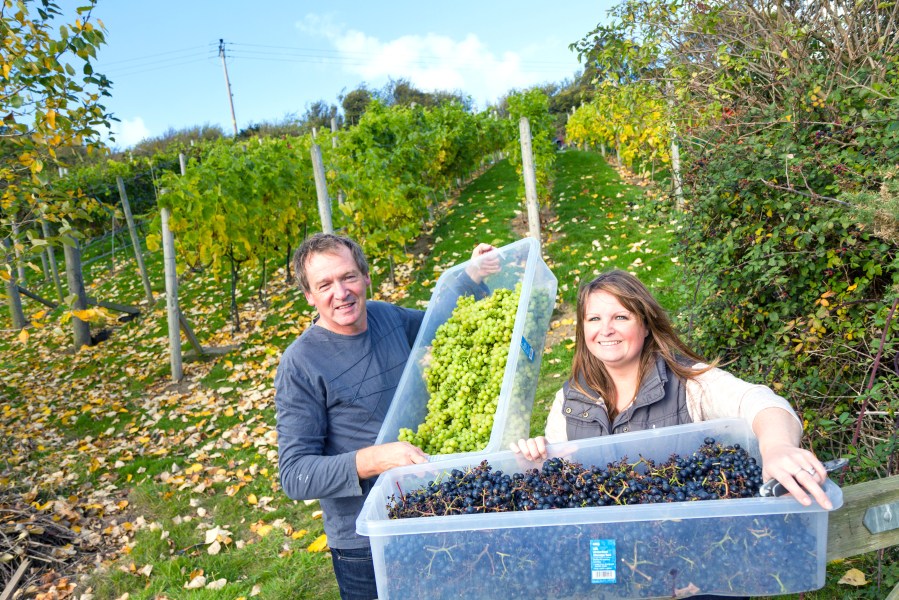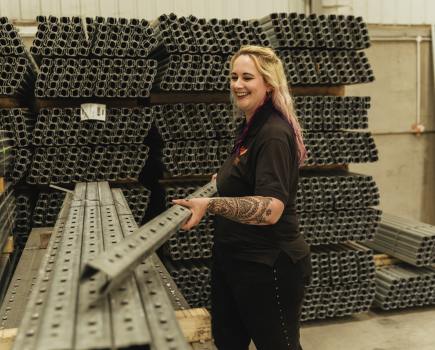From the aluminium industry to Gwinllan Conwy, Wales’ most northern mainland vineyard.
What did you have for breakfast this morning?
Smoked haddock and poached eggs with a cup of Earl Grey.
How are the vines looking at the moment?
The existing vines have never looked better, but with the hot, dry season a lot of this year’s plantings are struggling.
How did you choose your current vineyard site?
In 2012 we decided to plant 100 vines on the hillside next to our house. We didn’t seek advice as our neighbouring farmer told us vines had been planted there previously, and it was just going to be a hobby. It seems to work well so we’ve added more plantings and now have three acres in total.
What is the Foehn effect and does it help your vines?
The Foehn effect is a type of dry, warm, down slope wind that occurs on a side of a mountain range. For us it is a correlation between sea and mountain where the winds over the Snowdonia Mountain Range give us a unique microclimate in north Wales. This helps our vineyard with early bud burst and warmer winters with little frost, which in turn provides a longer growing season.
What is the biggest challenge of managing a vineyard in north Wales?
Weather, particularly strong winds.
Out in the vineyard which is your favourite variety to work with and why?
Solaris because it is very hardy, vigorous and easy to work with.
What is your favourite time of year in the vineyard?
Fruit set and knowing that we have got past the vulnerable time of flowering.
Why did you choose to plant hybrid varieties?
As well as looking for reliability, early ripening and disease resistant varieties we decided to plant what we liked the taste of. We thought that Solaris makes a fabulous wine and Rondo also has great potential. Alongside the hybrids, this year we have chosen to plant some Seyval blanc and Pinot noir.
To spray, or not to spray?
Nutrients and preventative sprays for mildew are essential, however, we try to minimise the amount of fungicides.
What are the most common misconceptions of Welsh wines?
Despite people thinking that you can’t grow grapes in north Wales and that the wines cannot be very good in terms of quality or taste we have managed it and our wines have gone on to win lots of awards. Our 2015 Pefriog is an International Wine Challenge silver medal winner and our 2017 Solaris received a bronze medal in the 2018 Wines of Great Britain Awards.
What is the best piece of vineyard machinery you have invested in and why?
Ground care takes a long time so we invested in a flail mower and this speeds up the process considerably.
What advice would you give to your younger self?
Seek as much help and assistance from other vineyard owners, particularly experienced members of the Welsh Vineyards Association (WVA). It is a very close knit, friendly association which offers help to all, including equipment sharing, courses, advice and so on. Sadly, some don’t take advantage of it.
What were the key challenges in finding a contract winemaker?
Finding someone with high enough standards, equipment and technology to produce good quality wine, while being small enough to accommodate artisan vineyards.
Where do you think the Welsh wine industry will be in 10 years’ time?
Since we planted in 2012 there have been 17 new vineyards planted in Wales so I imagine it will be at least treble the size it is now.




